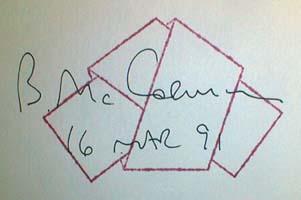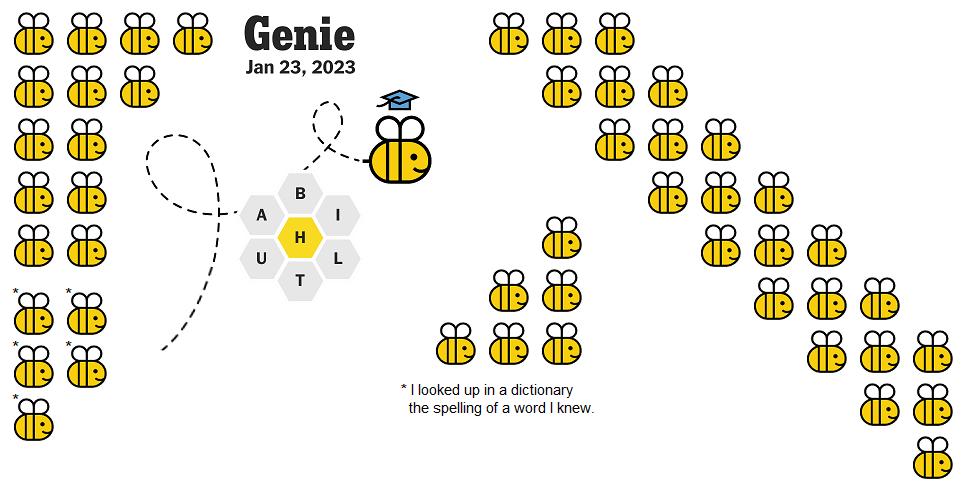 Welcome
Welcome Essay submitted in fulfillment of first assignment in apocryphal class: Covid 19
Essay submitted in fulfillment of first assignment in apocryphal class: Covid 19[ref.: The toast raised by somebody on Saturday Night Live: "To the class of Covid-19!"]
Did I already submit part of this long ago? I am finding that I may be subject to false memories.[1] Item: When I visited Hiroshima ca. 1984, I wrote in the A-bomb Memorial guestbook: "My father was an engineer on a B-29 that fire-bombed Tokyo". I later obtained what I believe is a copy of his WWII military record, and it seemed to say my father was a gunner on a B-29, and his only deployment outside the continental United States was a brief time on Puerto Rico[8]. Where did I get that "engineer... firebombed Tokyo" idea from? From him? From my own faultily firing neurons? On the other hand, I seem to remember from my parents something about "Alamogordo"; that was not on the record I obtained, either. I don't know and it's long since too late to find out (my father died in 1984).
The quote "Seedcorn scattered to the wind, knowledge (wisdom?) for whoever finds" is from Norbert Elias.
 This is the first page I contributed to APtS (A Place to Study), after Robbie's invitation, 18 May 2020: "Would you be interested / willing...."[2]
This is the first page I contributed to APtS (A Place to Study), after Robbie's invitation, 18 May 2020: "Would you be interested / willing...."[2]
When I was in the seventh grade (1958-59), at some point I switched from writing, esp. doing my written school assignments, in cursive script[3], which was the norm at the time, to writing all upper-case "print" letters, with Capital letters distinguished by making them taller than the rest.[4] I have never known exactly when or how I came to do this. Later in life I did see that my father wrote printed letters, not cursive script, but he used upper and lower case.
Because I was an "A" student, my teache[r]s -- whom us students called: "masters" — apparently figured they did not have the power to force me to write correctly. One of them — a Mr. Mike Rentko, if I remember said item's name correctly — tried to address the situation by threatening me since he presumably dared not try to coerce me by giving me bad grades for good work or refusing to accept my work at all. The big hunk of meat his body was stood over wimpy little me cowering in my little pupil desk, and his oral orifice emitted a warning at me that, while I might get away with what I was doing "in school", "in college" I would not be able to "keep up" because I would not be able to write fast enough to do my assignments on time. I was not a "good listener". [Aside: I did my math assignments in ink, which also irritated some of "them". And another thought: How could "they" have expected me to write anything, when they didn't help me have something to say?] I continued in my errant way up to this day, now some 60 years later, without ever having any further problem with my hand-writing style.[5]
+2023.09.26 addendum: The more I think and smolder over this incident, the more what really strikes me here was Mr. Rentko telling me I "might get away with" my hanwriting stylw, not that I would have trouble keeping up. He was all bent out of shape because he perceived I was getting away with disobeying the law, not just being foolish. Maybe he at least vaguely sensed that what I did was a potential threat to his pedagogical-political regime: his and the rest of the faculty's power, their self-images (sense of self-worth) and even their paychecks. If I could decide how to write might I decide what the study too? Alas I was not aware enough to pick up on this at the time. Now I see no reason why I should have submitted to the curriculum in general, but I was just kid then, so they got away with it.
What happen after Mr. Rentko? I seem to recall that another "bright" student in my class at some point copied my hand-writing style. When it came time to make our graduating class yearbook, the most mathematically gifted student in my class changed the cover of the yearbook from the until then standard padded [bas relief?] plastic kitsch picture of a knight on horseback (we were "the Crusaders"...) to a plain blue cloth cover. And the yearbook editor — that other "bright" student" — asked me to write "Crusader 1964" to be printed discretely in gold near the bottom right corner. He asked me to do it because he thought my hand writing was the most beautiful. [That yearbook cover was perhaps the first instance in my life of the "modernism" I would later come to learn about and love. Mies van der Rohe: "God is in the details."]
Over the years, my hand-writing did evolve. I spent effort on the letter "y", with which to this day I still am not altogether satisfied. And, yes, over the years, some letters have tended sporadically to elide a bit. But the basic style has remained unchanged. I once even experimented to write a few words in cursive script. I had almost forgotten how to do it, found it very difficult to do, and also felt it repellently ugly. [In no way could I compete with Thomas Jefferson!]
The rest of the story: In college I continued to fill my "blue book" [always time-limited] exam essay question answers with my "printing". But I forced myself to put correct fingers on a typewriter's keys, and soon learned to type pretty much as fast as I could think[6] [perhaps even more important: typing can at worst produce typos; hand writing can be illegible; the typed page provides nice space for hand-noting corrections, etc.]. I bought an Olympia office manual (ref.: SG3) typewriter, which was so well made that I felt a bit raised up each time I approached it to type on it or even just looked at it. Made in Western Germany, with an interchangeable carriage (a wide carriage was available although I did not have one) and, I believe, two user-replaceable keys for if the owner needed special symbols. Perhaps pursuant to my earlier wilfullness, I chose a typeface for my SG3 that had "square" letters, not letters with the more usual rounded corners. [I also chose the manual rather than an "electric" in part because it was less expensive, but primarily in case I would ever be in a place that did not have electricity.]
But the typewriter was still just a better handwriting machine. Revising text on a typewriter is still a very high-cost operation [you have to copy what you have not changed unless your change can be finessed with "Wite-Out"]. I always abhored "doing things over"(Sisyphus), so my essay assignments in college were generally concatenations of the first relevant/plausible words I thought I might commit to paper.
[Digression: Even though I never did outlines, rarely revised anything, etc., I usually got "good grades" on my papers, including once, if I recall correctly, the only time I ever tried to "please the teacher" (i.e., to write what I thought he would like, not what I thought), in this case very senior Yale philosophy professor, Paul Weiss, whose book "Modes of Being" was the core of the class and which I either/both did not understand/did not like. Whatever it was I wrote, his teaching assistant gave it, I seem to recall, a "96", which Professor Weiss personally crossed out and replaced with "97". This same professor, on my final "comprehensive" exam for my B.A. degree, wrote on what I wrote: "puerile", but I ended up "honors with exceptional distinction", nonetheless, due, I believe, to the benevolence of another professor, a genuine "existentialist", John Wild (author of "Existence and the World of Freedom", among other books), who liked me.]
In late youth, ca. age 33 (1979), while working as a computer programmer in IBM, I somehow came to write an essay of my ideas about computer programing ("The Gift From the Machine"), "on the computer", using, if I recall aright, Script/VS on a terminal attached to an IBM System 370 mainframe. That is how I learned about revising, and discovered "thinking by writing", i.e., "thinking by revising", due to revising no longer being a Sisyphean task. I said even at the time, "the computer at last taught me how to write", i.e., to write well, by revising, revising, revising. [Note: That is a self-reflexive sentence, since I have done revising/thinking about the present text subsequent to its initial incarnation.]
Somewhat later, at the onset of middle age, when I went back to school at Teachers College, I did a lot more writing "on the computer", including especially my Ed.D. dissertation ("Communication: The Social Matrix of Supervision of Psychotherapy"). A lot more thinking by revising, a gaining ever better confidence [how far deserved?] about my writing... continuing to the now present day.
That is the end of this story. At [insurance age] 74, I still "print" everything I write by hand, and when it comes to thinking, I type on the computer, and revise often. But lately [in our present time of coronavirus pandemic], in my rush to communicate, all too often I lament to look back and see how I could have done even better: made my words strike their target more focally and with greater penetrative force [as Muhammad Ali said: "Float like a butterfly; sting like a bee"], or, in the less frequent instances of play, be more enchanting, had I revised yet again [even sometimes changing just one word...] before hitting "Send".[7]
I would never have thought of ending a school assignment with: "Thank you for reading". That enhancement has come even later in life after "TC", and when I am not writing under threat of an "Or else!" should teacher not annuit coeptis.
Thank you for reading.
[The original text of this little essay ended:] [Time's up. Not really. But: "Send"]
[A thought I just now recalled, from a Cat Stevens song: "But take your time, think a lot. Why, think of everything you've got.
For you will still be here tomorrow, but your dreams may not."; The original version of this essay was an email I wrote in an hour at 11PM one night, and sent to "Robbie" and to a high school teacher reading specialist.]

